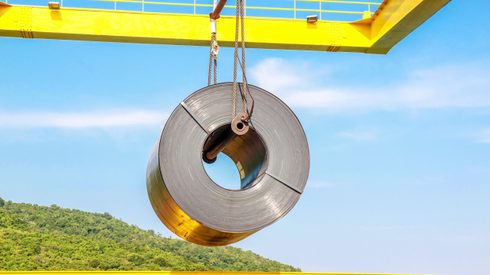On Monday October 28, Jinnan announced that it will be focusing on innovations in iron ore concentrating and pelletizing technology – including magnetic separation – to support a low-carbon steel footprint outside of China.
Sources told Fastmarkets the move was the latest steelmaker response to Chinese government controls on domestic crude steel output and the country’s policy of “no new steel capacity” that has emerged in recent years.
The investment in the Sohar concentration plant amounts to more than $600 million so far and the facility is scheduled to commence operations by mid-2027, the steelmaker said.
Vale is investing $227 million to connect the concentration plant to its existing agglomeration facilities in Sohar, while Jinnan is investing about $400 million to build, own and operate the new facility.
The concentration plant will supply 12.60 million tonnes of high-grade concentrate annually for the production of pellets and briquettes – key raw materials for the manufacture of low-carbon steel products via the direct-reduction route.
“This partnership is a unique opportunity to blend Jinnan’s rich experiences in modern low-carbon steelmaking with Vale’s proven expertise in iron ore production,” Jinnan Iron & Steel Group chief executive Zhang Tianfu said. “By working together [with Vale] in Sohar, we aim to redefine steelmaking in the Middle East, [by] bringing efficiency and quality to the forefront.”
Vale president Gustavo Pimenta said the project would expand the Brazilian miner’s presence in the region.
“The Sohar concentration plant represents a key investment for Vale [because it] enhances our ability to meet the increasing global demand for high-grade iron ore and further build our presence in the Middle East,” Pimenta said.
Fastmarkets’ weekly iron ore DR-grade pellet premium indicator was calculated at $42-48 per tonne on October 23, unchanged from the previous week.
And Fastmarkets’ index for iron ore, 65% Fe Brazil-origin fines, cfr Qingdao, which has been used as the basis for DR pellet premium contracts since 2019, averaged $119.06 per tonne as of October 28, up from the September average of $106.79 per tonne given the slight improvement of Chinese mills’ margins.
Want to track iron ore prices with market-reflective price data and iron ore price charts? Find out more about how you can access the latest iron ore prices here.
A trader in Japan told Fastmarkets that while some volumes from the Sohar concentration plant might go directly to Vale’s Oman pellet plant, the remainder was likely to be sold into the regional spot market.
And a Dubai-based trader said: “Some local pellet plants might be interested to see a new supplies of high-grade pellet feed [and] we’re waiting to see if there [will be an opportunity to] trade in the new pellet feed cargoes.”
Jinnan’s investment is the latest foray by a Chinese steelmaker into investing in low-carbon steelmaking capacity in the Middle East
In August 2022, Chinese companies Tianjin TEDA Investment Holding Group and Delong Steel Group New Tianjin Steel signed a strategic cooperation agreement to develop a 10 million tonnes per year electric-arc furnace (EAF) steel plant in Saudi Arabia, Fastmarkets understands.
And in May 2023, China’s Baoshan Iron & Steel announced plans to build its first overseas “green steel” plant, with a natural gas-powered direct-reduced iron (DRI)-based EAF, by the end of 2026.
Then, in June 2024, China’s Delong Steel announced that it would be working with Emirates Steel Arkan to build and operate a low-carbon raw materials production facility to support the local steel industry in the Middle East.
The Middle East is rich in natural gas reserves but short on metallurgical coal and steel scrap resources, which makes it suitable for DRI-EAF steelmaking, leading to long-term demand for high-grade pellet feed to produce DR pellets.
Its natural gas reserves and renewable energy attracted Vale to link up with local authorities and other clients to invest in green briquette “megahubs” in Oman, Saudi Arabia and United Arab Emirates, to jointly produce hot briquetted iron (HBI) and steel products, with significantly reduced CO2 emissions, for the local and seaborne markets.
Follow the low-carbon steel discussion and keep up-to-date with the developments influencing the decarbonization of the steel industry. Visit our dedicated green steel insights hub here.





